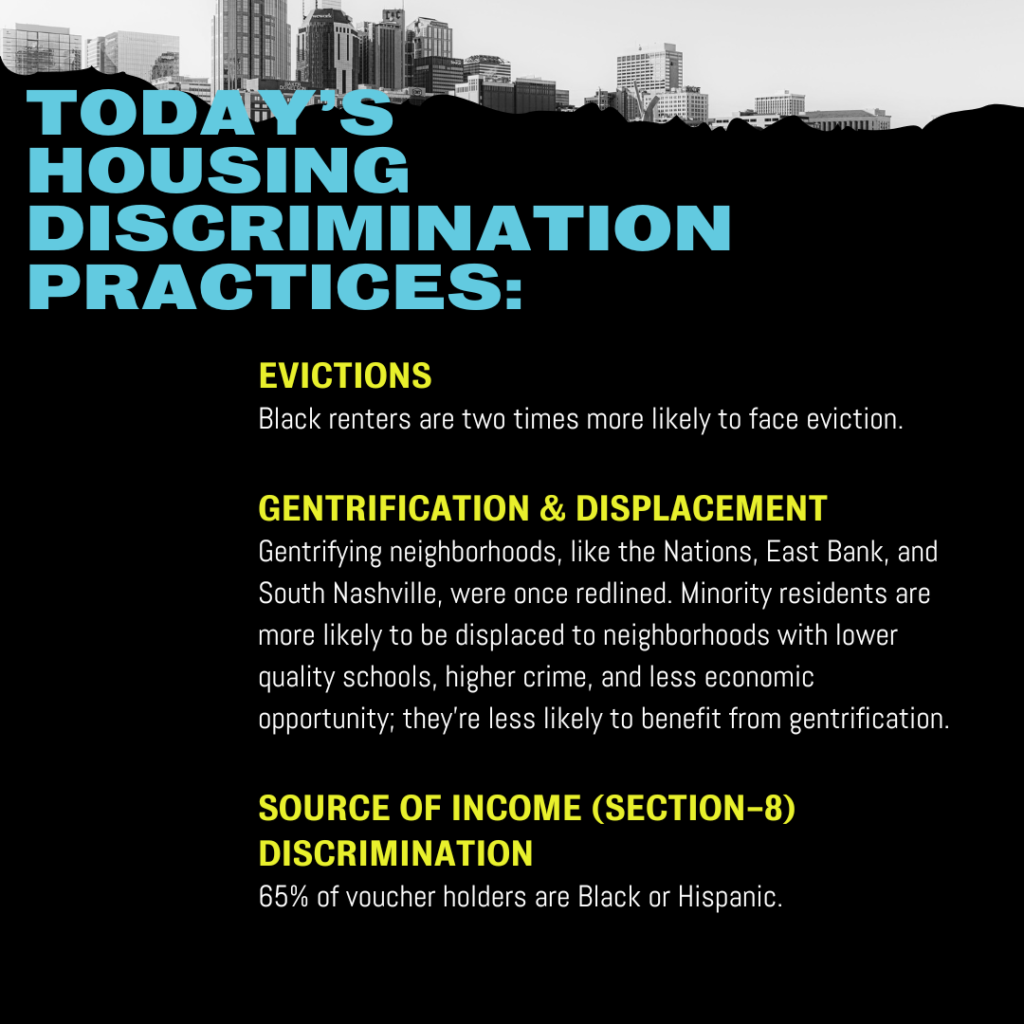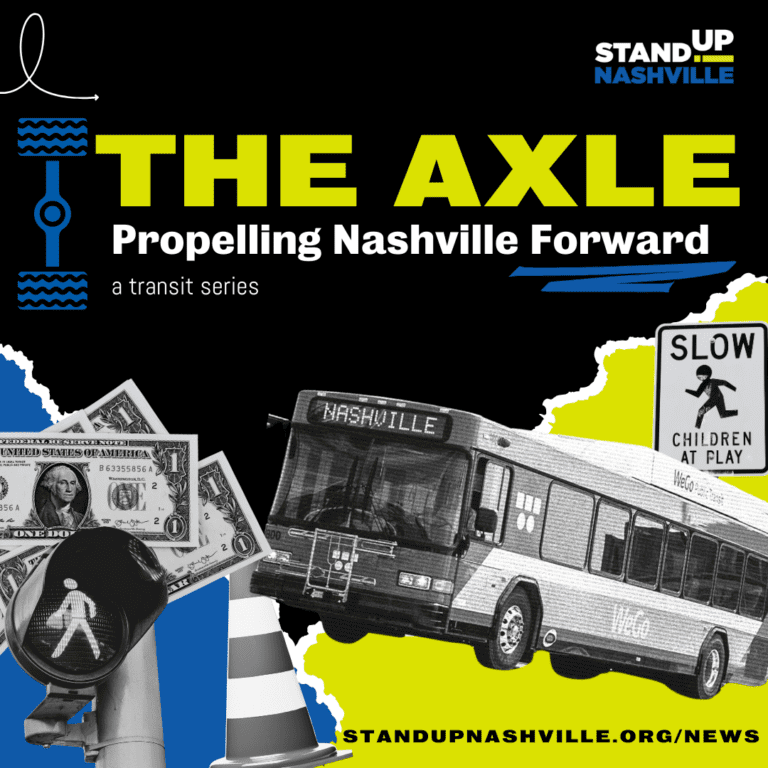The most common forms of housing discrimination today are eviction, gentrification, and displacement.
- Eviction – the act of expelling someone from housing. Often, Black renters are twice as likely to face eviction than white renters. Tennessee has some of the weakest tenant rights protections in the country that only furthers Nashville’s high eviction rate.
- Gentrification & displacement – The process of urban areas being transformed in favor of higher priced development including luxury housing and businesses. This act uproots existing residents and displaces them from their neighbors and long-lived and loved communities. Gentrifying neighborhoods, like the Nations, East Bank, and South Nashville, were once redlined. Minority residents are more likely to be displaced to neighborhoods with lower quality schools, higher crime, and less economic opportunity; they’re less likely to benefit from gentrification.
- Source of income (Section-8) discrimination – Section 8 Housing is a federally-funded program that provides rental assistance to low-income families, elderly individuals, and people with disabilities. It assists individuals and families subsidizing a portion of their rent payment through housing vouchers. Nationally, Black and Hispanic residents make up 65% of Section-8 participants. Voucher recipients are often denied rental housing simply because of their voucher use.
The issues of housing do not stand alone, they are a part of larger economic problems. For example, some voucher recipients struggle with housing because they are unable to obtain jobs with living wages or full-time jobs. If they were able to earn more it would open the door to other housing options and improve their quality of life.
Housing discrimination and affordable housing are connected. When people are discriminated against by powerful systems, those same systems continue to perpetuate harm in other ways including education, finance, and healthcare.
Stand Up Nashville boldly advocates for the planning and development of our city to reflect the priorities of its residents. One of the ways SUN works to ensure economic development is through the use of community benefits agreements. When Nashville Soccer Holdings made plans for the GEODIS Park complex, we championed a CBA that addressed the needs of community members. We included assurances for affordable housing, jobs and workforce development, childcare, and a committee for accountability. That’s just one CBA for one development project. Imagine the positive impact if our city leaders required similar assurances for future deals?
Nashville Planning Department
Last week we shared that Lucy Kempf, the executive director of Nashville’s Planning Department signed a pledge in 2021 with 20 other city planners across the country to acknowledge and correct harms caused by housing discrimination. We also asked readers if they believe the department is working towards or against their commitment. Every response indicated the belief that the planning department is not fulfilling its commitment, here’s some of them:
- “I think that if they truly were committed to strengthening BIPOC communities instead of allowing the proliferation of gentrification they would be pouring millions into the Napier Community and North Nashville. Until I see funneling of resources into historically marginalized communities in Nashville, I do not believe that they are upholding their commitment.” – Natalie S.
- “Nothing but window dressing. In our greedy capitalist society money talks and no one gets rich off of affordable housing. The horse is out of the barn. We have a regressive tax structure that is unfair and prices the working men and women out of the market… Everyone says they want to fix this but no one is putting forth real solutions.” – Brian B.
- “I don’t think they are working towards it at all. If they are, I don’t see enough change to reflect it. There’s so many waiting for housing that it’s sad & hurts our communities & households that are having to cram people in against their lease just so they don’t have their family out on the streets. The section 8 housing list seems to not even move.” – L. H.
- “I would like to see a town hall with Nashville’s Planning Department. I think there should be a commission within the department whose sole duty is to investigate claims of discrimination.” – Bohnne J.
What is the Planning Department doing?
In January 2022, the Planning Department established the Metro Housing Division. The division works through community engagement and data to align systems and resources to advance resident-centered and neighborhood appropriate housing solutions to address long-standing housing inequities.
Its work is based on the 2021 Affordable Housing Taskforce Report and aims to implement high priority recommendations, build staff capacity, and lay groundwork for a comprehensive housing strategy. Their plan for housing security aims to:
- Build new funding, incentives, and properties
- Preserve existing funding, tax assistance, and rehabilitation
- Increase access to resources, lower barriers, and fair housing
- Promote stability for tenant protections, loss prevention, and fair housing
Additionally, the Metro Housing Division is submitting an application to HUD for Pathways to Removing Obstacles to Housing (PRO Housing). The application is available for review and comment through Tuesday, October 17 at 11pm. There will be two public meetings on Wednesday, October 11: an 11:30am virtual public meeting, and a 5:30pm in-person meeting. Click here for more information.
That’s a start. We’ll continue to hold leaders accountable and advocate for progress that goes beyond documentation and becomes sustained reality.
Together in advocacy and action,
Stand Up Nashville







